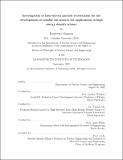Investigation of laser-driven particle acceleration for the development of tunable ion sources for applications in high energy density science
Author(s)
Simpson, Raspberry
DownloadThesis PDF (32.92Mb)
Advisor
Winslow, Lindley
Ma, Tammy
Terms of use
Metadata
Show full item recordAbstract
Since the innovation of chirped pulse amplification by Donna Strickland and Gerard Morou in 1985, laser technology has evolved such that we can create short pulses of light (10⁻¹⁵ − 10⁻¹² seconds) with high peak powers (1015 Watts) in small, focused spots (∼a few microns). A prolific area of research that has emerged over the last two decades is the use of these high-intensity lasers to drive particle beams. Possible applications of these particle sources include isotope production for medical applications, proton cancer therapy, and fusion energy schemes. This thesis focuses on laser-driven proton acceleration and adds to the existing foundation of work in the area by investigating new empirical relationships, conducting new measurements of the accelerating electric field responsible for laser-driven proton acceleration, and developing a new data analysis methodology using machine learning. This work first examines laser-driven proton acceleration in the multi-picosecond regime (>1ps) at laser intensities of 10¹⁷ − 10¹⁹ W/cm². This is motivated by recent results on laser platforms like the National Ignition Facility-Advanced Radiographic Capability laser and the OMEGA-Extended Performance laser, which have demonstrated enhanced accelerated proton energies when compared to established scaling laws. A detailed scaling study was performed on the Titan laser, which provided the basis for a new analytical scaling presented in this thesis. In addition, high-repetition-rate (HRR) lasers that can operate at 1 Hz or faster are now coming online around the world, opening a myriad of opportunities for accelerating the rate of learning on laser-driven particle experiments. To unlock these applications, HRR diagnostics combined with real-time analysis tools must be developed to process experimental measurements and outputs at HRR. Towards this goal, this thesis presents a novel automated data analysis framework based on machine learning and proposes a new methodology based on representation learning to integrate heterogeneous data constrain parameters that are not directly measurable. Taken together, these thrusts enable a new preliminary framework for enhanced analysis of complex HRR experiments and a foundational step towards realizing the goal of tunable laser-driven particle sources.
Date issued
2022-09Department
Massachusetts Institute of Technology. Department of Nuclear Science and EngineeringPublisher
Massachusetts Institute of Technology